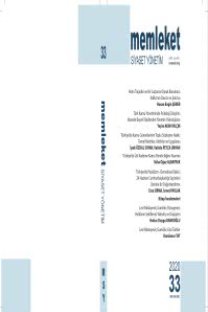Küresel krizin istihdama etkileri ve kriz karşıtı işgücü piyasası önlemleri
Gelişmiş kapitalist ülkelerde başlayan ve mali sektörden reel ekonomiye ta¬şınan küresel krizin etkileri, Türkiye'nin "krizden önceki krizi"ni daha da ağırlaştırmış ve Türkiye, 2009 yılında daralan bir ekonomi ve artan işsizlik oranları ile karşı karşıya kalmıştır. Türkiye, krize karşı, aralarında aktif ve pasif işgücü piyasası önlemleri de bulunan bir dizi önlem almıştır. Aktif işgücü piyasası politikaları olarak, işverenlere sağlanan istihdam teşvikleri, İŞKUR vasıtasıyla sağlanan mesleki eğitim ve toplum yararına çalışma ön plana çıkmaktadır. Pasif işgücü piyasası politikaları kapsamında ise kısa çalışma ve ücret garanti fonu altındaki Ödemelere ağırlık verilmiştir. İşsizlik sigortasına hak kazanma ve yararlanma koşullarında iyileşme sağlanmamış, yalnızca bağlanan işsizlik ödeneğinde sınırlı bir iyileşmenin yolunu açan bir düzenleme yapılmıştır. İstihdam teşvikleri için İşsizlik Sigortası Fonunun kullanılması, işsizlik sigortasına prim ödemeyen diğer işsizlerin de mesleki eğitim ve diğer Fon kaynaklı önlemlerden yararlandırılmaları ve özellikle de Fon gelirlerinden bir bölümünün alt yapı yatırımları ve sosyal harcamalar için bütçeye aktarılması, Fon kaynaklarının amacı dışında kullanılmasına yol açmıştır. Bir etki analizi yapılmamış olmakla birlikte, ilk sonuçlara bakıldı¬ğında, kriz döneminde alınan işgücü piyasası önlemlerinin istihdam yaratma kapasitesinin, sınırlı kaldığı görülmüştür.
The effects of the global crises on employment and the labour market measures against the crises
he effects of global crises which started in the developed capitalist countries and which was transferred from the world of finance to the real economy, aggravated "the crises before the crises" in Turkey, leaving the country with a contracting economy and rising unemployment rates in 2009. Turkey, have taken a number of measures against the crisis, including active and passive labor market measures. As active labor market policies, employment incentives provided to employers, vocational training and work for the community benefit provided through ISKUR have come to the fore. As passive labor market policies, focus was on short work payments and payments under the wage guarantee fund. The conditions of eligibility and terms of entitlement to unemployment benefits are not improved, except an arrangement which resulted in a limited improvement in the amount of the unemployment benefit. The use of Unemployment Insurance Fund for employment promotion, the inclusion of the rest of the unemployed who do not pay premium in the vocational training programs and other measures financed from the Fund, and especially the transfer of the Fund revenues to the state budget to finance infrastructure investments and social expenditures have led to the use of Fund resources for purposes other than its own. Although an impact analysis has not been made, the first results indicate that employment creation capacity of the labour market measures adopted during the crises period has remained limited.
___
- Blackburn, R. (2008), "The Subprime Crises", New Left Review, 50 March-April, 63-106.
- Boratav, K. (2009), "Bunalım Ortamında Çevre Ekonomileri", Sol Portal, http://haber.sol.org.tr/yazarlar/!3560.html
- BSB Bağımsız Sosyal Bilimciler (2008), 2008 Kavşağında Türkiye, Yordam Kitap, İstanbul.
- DPT Devlet Planlama Teşkilatı (2009a), Ekonomik Gelişmeler Eylül 2009, http://ekutup.dpt.gov.tr/tg/index.asp?yayin=eg&yil=0&ay=0
- DPT Devlet Planlama Teşkilatı (2009b), Genel Ekonomik Hedefler ve Yatırımlar, 2010, http://www.dpt.gov.tr/PortalDesign/PortalControls/ WebIcerikGosterim.aspx?Enc=83D5A6FF03C7B4FC9F38684094B C4B9B
- DPT Devlet Planlama Teşkilatı (2009c), Orta Vadeli Ekonomik Program, 2010-2012, http://ekutup.dpt.gov.tr/program/200911.pdf
- DPT Devlet Planlama Teşkilatı (2008), 2009 Yılı Programı, Devlet Planlama Teşkilatı, Ankara.
- Gurria, A. (2009), Introductory Remarks by Angel Gurria, OECD Secretary-General, at the G8 Labour Ministerial, Social Summit 2009, http://www.oecd.Org/document/7/0,3343,en_2649_34487_424 60103_l_l_l_l,00.html
- ILO International Labour Office (2008), Press Release, 20 October, ILO/08/45, http://www.ilo.org/global/About_the_ILO/Media_and_ public_information/Press_releases/lang~en/WCMS_099529/index. htm
- ILO International Labour Office (2009a), The Financial and Econo¬mic Crisis: A Decent Work Response, International Labour Office, Geneva.
- ILO International Labour Office (2009b), Global employment trends: January 2009, International Labour Office, Geneva.
- ILO International Labour Office (2009c), Global Wage Report, Upda¬te 2009, http://www.ilo.org/wcmsp5/groups/public/-dgreports/— dcomm/documents/publication/wcms_116500.pdf
- IMF International Monetary Fund (2009a), Global Financial Stability Report October 2009, International Monetary Fund, Washington DC.
- IMF International Monetary Fund (2009b), World Economic Outlook October 2009, Sustaining the Recovery, International Monetary Fund Washington DC.
- IMF International Monetary Fund (2010), World Economic Outlook Update, http://www.imf.org/external/pubs/ft/weo/2010/update/01/ index.htm
- İSO İstanbul Sanayi Odası (2009), "Krize Karşı Mücadelemize Var -Gücümüzle Devam Edeceğiz", İstanbul Sanayi Odası, http://www. İso.org.tr/tr/web/statiksayfalar/index.aspx?ref=0
- Khatiwada, S. (2009), Stimulus Packages to Counter Global Economic Crisis: A review, International Labour Organization, International Institute for Labour Studies, Geneva.
- T.C. Hazine Müsteşarlığı (2009), Küresel Mali Krize Karşı Politika Tedbirleri, 10 Ağustos, http://www.hazine.gov.tr/doc/Guncel/Politi- kaTedbirleri.pdfT.C. Hazine Müsteşarlığı (2010), Aylık Ekonomik Göstergeler Mart 2010, http://www.treasury.gov.tr/irj/go/km/docs/ documents/Treasury%20Web/Statistics/Economic%20Indicators/ egosterge/PDF/lCINDEKILER.pdf
- UNCTAD United Nations Conference on Trade and Development (2008), Will we never learn?, UNCTAD Policy Briefs, http://www. unctad.org/en/docs/presspb20085_en.pdf
- Uras, G. (2009), "Kriz bizi neden çok, hem de pek çok sarstı?", Milliyet Gazetesi, 3 Temmuz.
- ISSN: 1306-8202
- Yayın Aralığı: Yılda 2 Sayı
- Başlangıç: 2006
- Yayıncı: Yerel Yönetim Araştırma Yardım ve Eğitim Derneği (YAYED)
Sayıdaki Diğer Makaleler
Yabancılara toprak satışı: Tarihsel eğilimler
BAYRAMOĞLU. Sonay ÖZUĞURLU, KAYIKÇI. Mehtap YILMAZ
NİLGÜN GÖRER TAMER, Fatma ERDOĞANARAS, ÜLKÜ YÜKSEL, ÖZLEM GÜZEY KOCATAŞ
Küresel krizin istihdama etkileri ve kriz karşıtı işgücü piyasası önlemleri
1968: Elmalı ovasında Devrim günleri
Doğal kaynağa dayalı sermaye birikimi ve orman sayılan alanlarda mülkiyet hakları
Türkiye'nin iktisadi ve siyasi tarihinde toprak reformu tartışmalarının rolü
Yönetim olgusu üzerine 1909 tarihli bir makale: " Sosyal bilimler ve yönetim bilimi "
2000'ler Türkiye'sinde tarım politikaları ve toprak mülkiyeti: Efemçukuru'nda " Mülkiyet Nedir ?"
